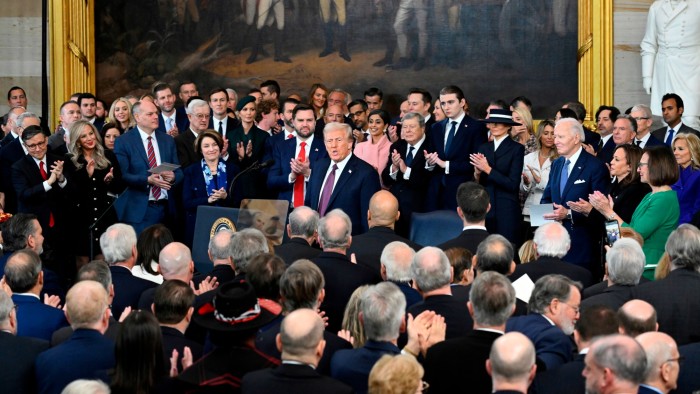Unlock the White House Watch newsletter for free
Your guide to what the 2024 US election means for Washington and the world
US president Donald Trump has said he will withdraw the US from the historic Paris climate agreement, dealing a blow to worldwide efforts to slow global warming following the hottest year on record.
The move was announced on Monday after Trump took the oath of office, replacing Joe Biden as US president.
“President Trump will withdraw from the Paris climate accord,” the White House said in an email listing the new administration’s priorities less than half an hour after the new president took office.
America’s exit from the 2015 accord, which was signed by almost 200 countries, means the world’s largest historical polluter will once again walk away from its commitment to curb greenhouse gas emissions.
Rachel Cleetus, policy director at the Union of Concerned Scientists, said the US withdrawal was “a travesty” and “in clear defiance of scientific realities”.
In his inaugural speech Trump said he would seek to make maximum use of the US’s oil and gas reserves. He has previously described climate change as a “hoax”.
Last year was the first calendar year that average temperatures surpassed the 2015 Paris accord target of limiting warming since pre-industrial times to well under 2C and preferably to 1.5C.
The world is on track for a temperature rise of up to 2.9C above pre-industrial levels, according to a UN report.
The US is the only country to have left the Paris agreement — under the first Trump administration in 2017, in a process that took more than two years. But it rejoined under Biden in February 2021. Former president of Brazil Jair Bolsonaro also threatened to pull out, but did not follow through.
The head of the UN climate change arm which oversees the Paris agreement, Simon Stiell, said on Monday: “The door remains open . . . and we welcome constructive engagement from all countries.”
Laurence Tubiana, a key architect of the Paris agreement, said the US move to quit was “unfortunate” but the accord was “stronger than any single country’s politics and policies.”
Some experts said the Trump moves to reverse Biden “green” policies would give an advantage to China, which is the world’s largest manufacturer of electric vehicles, solar panels and batteries.
“China will be happy to wave in the rear-view mirror of one of its world-leading EVs, as US manufacturers hobble on,” said Tim Sahay, co-director of the net zero industrial policy lab of Johns Hopkins University.
The Biden administration raised the bar on US climate targets in its final month in office, setting a goal for a cut of economy-wide greenhouse gases of 61 to 66 per cent by 2035 from 2005 levels.
At the last UN climate summit in Baku, Joe Biden’s top climate adviser John Podesta conceded that US efforts to tackle global warming “may be put on the back burner” under Trump’s White House, but sought to reassure US allies that this would not stop the shift to green energy and technology by business, states, cities and local authorities.
Read the full article here




